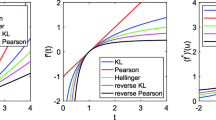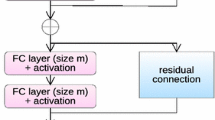Abstract
Descent property and global convergence proofs are given for a new hybrid conjugate gradient algorithm. Computational results for this algorithm are also given and compared with those of the Fletcher-Reeves method and the Polak-Ribière method, showing a considerable improvement over the latter two methods. We also give new criteria for restarting conjugate gradient algorithms that prove to be computationally very efficient. These criteria provide a descent property and global convergence for any conjugate gradient algorithm using a nonnegative update β.
Similar content being viewed by others
References
Fletcher, R.,Practical Methods of Optimization, Vol. 1, Unconstrained Optimization, Wiley, Chichester, England, 1980.
Goldstein, A. A.,On Steepest Descent. SIAM Journal on Control, Vol. 3, pp. 147–151, 1965.
Fletcher, R., andReeves, C. M.,Function Minimization by Conjugate Gradients, Computer Journal, Vol. 7, pp. 143–154, 1964.
Polak, E., andRibière, G.,Note sur la Convergence des Méthodes de Directions Conjuguées, Revue Française, Information et Recherche Opérationelle, Vol. 16, pp. 35–43, 1969.
Powell, M. J. D.,Nonconvex Minimization Calculations and the Conjugate Gradient Method, Report No. DAMTP 1983/NA14, Department of Applied Mathematics and Theoretical Physics, University of Cambridge, Cambridge, England, 1983.
Al-Baali, M.,Descent Property and Global Convergence of the Fletcher-Reeves Method with Inexact Line-Search, IMA Journal of Numerical Analysis, Vol. 5, pp. 121–124, 1985.
Powell, M. J. D.,Restart Procedures for the Conjugate Gradient Method, Mathematical Programming, Vol. 12, pp. 241–254, 1977.
Powell, M. J. D.,Convergence Properties of Algorithms for Nonlinear Optimization, Report No. DAMTP 1985/NA1, Department of Applied Mathematics and Theoretical Physics, University of Cambridge, Cambridge, England, 1985.
Shanno, D. F.,Globally Convergent Conjugate Gradient Algorithms, Mathematical Programming, Vol. 33, pp. 61–67, 1985.
Touati-Ahmed, D., andStorey, C.,Globally Convergent Hybrid Conjugate Gradient Methods, Mathematics Research Report No. 196, Department of Mathematics, Loughborough University of Technology, Loughborough, Leicestershire, England, 1986.
Wolfe, M. A.,Numerical Methods for Unconstrained Optimization: An Introduction, Van Nostrand Reinhold, London, England, 1978.
Touati-Ahmed, D.,Efficient Hybrid Conjugate-Gradient Techniques, PhD Thesis, Department of Mathematics, Loughborough University of Technology, Loughborough, Leicestershire, England, 1988.
Author information
Authors and Affiliations
Additional information
Communicated by L. C. W. Dixon
Rights and permissions
About this article
Cite this article
Touati-Ahmed, D., Storey, C. Efficient hybrid conjugate gradient techniques. J Optim Theory Appl 64, 379–397 (1990). https://doi.org/10.1007/BF00939455
Issue Date:
DOI: https://doi.org/10.1007/BF00939455




